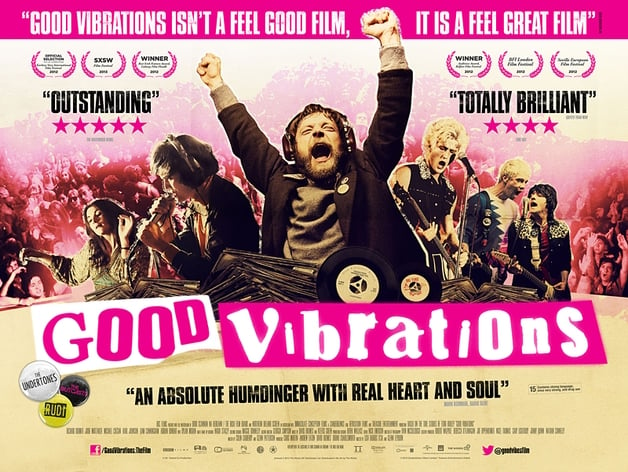
Good Vibrations takes its
name from a record shop opened by Terri Hooley (played here with a lot of charm
by Richard Dormer) on Great Victoria Street at the height of the Troubles –
back when the street was known as “Bomb Alley”, the most bombed half-mile in
Europe. After having an epiphany during a Rudi concert, Hooley starts making
his own records, creating a punk legacy in Belfast, which managed to cross the
sectarian boundaries like nothing else. The key moment, of course, is when he
meets a small band from Derry with a song called “Teenage Kicks.”
Good Vibrations makes it
clear from the very beginning where it stands on the Troubles – horrified
non-participation. Hooley simply ignores it, having fallen out with all his
political friends who have split to join divergent paramilitary groups.
Hooley’s mission is to bring people back together through music – something
that is taken a little too literally in an awkward scene in which Hooley makes
peace with his old friends by handing them a pile of free records – rather than
reach some kind of political or social calm. This is fair enough, obviously,
since the film is more about a man trying to bring punk to Belfast. However,
the film grows entirely unconvincing by its conclusion.
The Belfast Telegraph has declared
that Good Vibrations is the best Northern Irish film ever made. This, I
think, is unfair. Leaving aside the loose definition of what constitutes a
Northern Irish film - since its budget and locations come from both sides of
the border – this declaration gives the film too much praise. It makes the film
appear to be something it isn’t. Surely the “greatest” Northern Irish film ever
made should be more than just a cheeky little pop movie – it should be a film
that says something profound or important about Northern Ireland itself. To
digress briefly, two Irish documentaries produced years ago provide a good
comparative example: one, Mise Eire, celebrated the successful
revolutions that brought independence to most of Ireland; the other, Rocky Road to Dublin, criticized Ireland for its stagnation since
independence, claiming that the legacy of the heroes of the past was just as
guilty as the Catholic Church, lacklustre politicians and rampant state
censorship for a country stuck in the past. Sadly, Good Vibrations is Mise
Eire’s fictional Northern brother, a celebration of a country that is still
broken. With gleeful, optimistic denial, Good Vibrations ends with a
note saying that the Troubles are now over and ignores that Northern Ireland is
still divided and deeply sectarian. The film becomes a
politician-and-tourist-board-friendly film that gives Northern Ireland and its
people, whatever race or creed, the big pat on the back that it does not yet
deserve.
Obviously, it is silly to watch Good
Vibrations and expect a cogent political assessment of the here and now,
but it remains part of an irritating trend in Northern Ireland of celebrating
small achievements and ignoring big failures, of assuming everything is all
right despite today’s widespread protests and the dissident violence that has
not yet gone away.
Having said that, Good
Vibrations is undeniably a feel-good movie. Dormer’s plucky performance – it’s hard to
remember him playing a heavy in last year’s Jump - makes the whole thing
thoroughly likable and the film’s mood, one of sorrow and horror at the
violence and yet retaining a deliberate, almost oppositional, sense of fun, is
recognisable. The sequence in which “Teenage Kicks” is finally
played is note-perfect and almost brings a tear to the eye. The
helicopter-spotlight as super trouper idea makes for one of the movie’s most
memorable moments. Though the directors, Glenn Leyburn and Lisa Barros D’Sa, do
play around with the imagery a little too much, a failing that made their
previous debut feature Cherrybomb such a palpably shallow experience,
they show a real talent in their use of music.
However, the film’s greatest
weakness is a threadbare plot in the film’s second half when things get more
serious and the profane cheerfulness of the humour that is so recognisably
Belfast disappears. The film isn’t consistently funny and yet seems impatient
with the more dramatic moments – Jodie Whittaker, playing Hooley’s wife, has a
non-part that requires her to unsuccessfully try to put manners on Hooley and
then disappear. By the time the film ends with a concert in the Ulster Hall, it
has over-romanticised its subject into fantasy.
Good Vibrations is
a sign that Northern Ireland will begin producing films regularly, rather than
the fits and starts that saw something as great as Peacefire come and
go. Who doesn’t want a healthy domestic cinema and, in time, a masterpiece
even? Good Vibrations is a lot of fun and has two or three rather moving
moments, but it is nonetheless a film that gives a country a pat on the back
when what it really needs is a kick up the arse.

No comments:
Post a Comment